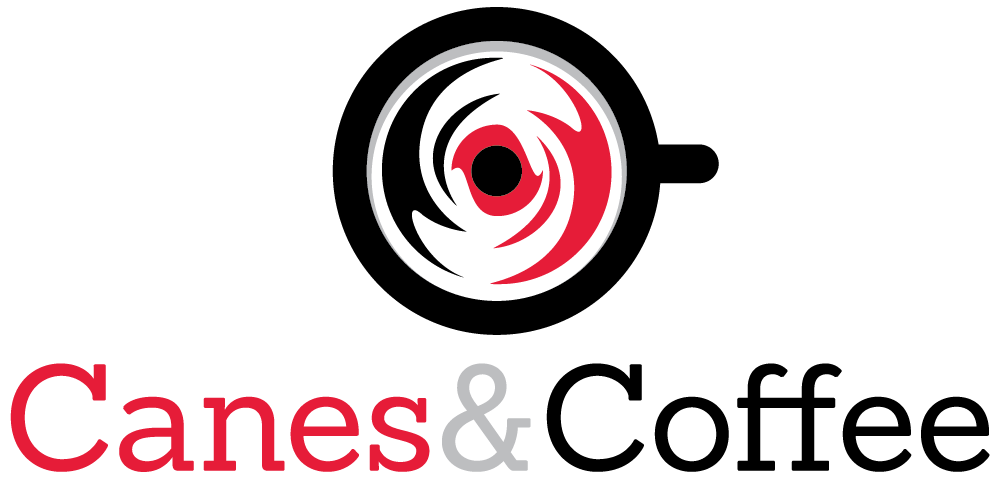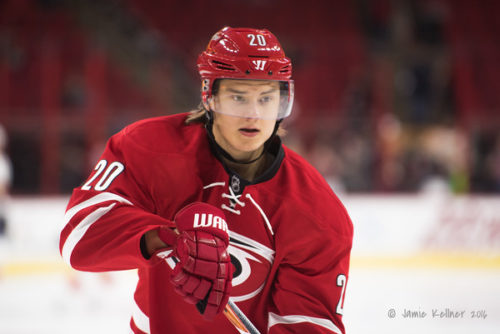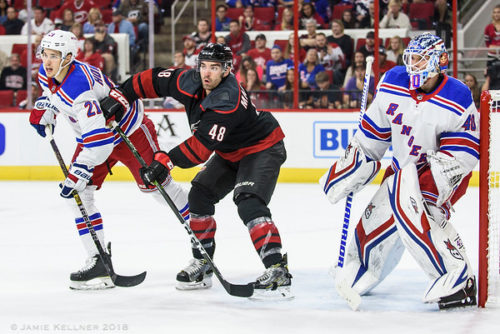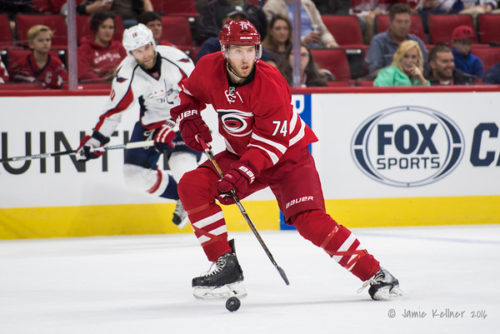Thanks to those who reached out to make sure I am okay during my writing hiatus. I am fine; just hit a combination of a couple things taking a lot of energy and a couple others taking a lot of time and not with flexibility for the after midnight writing that I have relied on at times to get through busy stretches in the past.
Hope is to get into a regular rhythm for writing about Canes and hockey on a steady basis even if not daily, so check in here and there, and you should find something to read most times.
Jack LaFontaine overcomes setbacks on path to NHL contract
As a starting point, Jack LaFontaine’s path to his first NHL contract is a great story. As a rising 18-year old prospect, he was drafted by the Hurricanes in the third round of the 2016 NHL Draft. Slotted to play for a top-tier NCAA program at the University of Michigan, there were no guarantees, but he clearly had a direct path to an NHL contract a couple years down the road. And like most athletes of his caliber at his age, I would be shocked if he did not have a bunch of people telling him how great he was and was going to be.
And that is about when the train to the NHL was completely derailed.
LaFontaine entered a crowded crease with a couple veterans in the mix and struggled to find his footing. In his freshman year at Michigan, he finished with a 1-7-1 record and 3.34 goals against average. His .911 save percentage suggested that he was a bit better than his record, but the bigger story was that he was suddenly fighting for ice time. In his sophomore season, he was 4-4-0 but his save percentage sunk to .889. During the summer at his sophomore season, he announced that he was leaving the University of Michigan to play in the BCHL for the Penticton Vees. While it is not uncommon for BCHL players to make it to the NHL (31 were on opening day rosters for 2021-22), more common is for less-heralded young players to use it an early stepping stone. After struggling to carve out a bigger role at Michigan, this was clearly a step backward for LaFontaine. That could easily have been the beginning of the end in terms of LaFontaine’s aspirations to play in the NHL
Bu presumably seeking more ice time and a chance to restart, he gained both and used them to build a new foundation. In 2018-19 with Penticton, LaFontaine posted a .923 save percentage and 2.19 goals against average. Maybe most significantly, he played 45 games that season. That new foundation led to a return to the NCAA with the University of Minnesota where he had a decent 2019-20 campaign and even better 2020-21 season winning the Mike Richter Award given the NCAA’s best goaltender with a sparkling 1.79 goals against average, .934 save percentage and 22-7-0 record.
At that point, Jack LaFontaine was going to get an NHL contract. But this is where some of the oddities of the NHL Collective Bargaining Agreement rules come into play.
Enter the NHL Collective Bargaining Agreement legalese
When an NHL team drafts an amateur player, they have exclusive rights to sign that player for a period of time. For 18-year old Canadian junior players, the teams’ draft rights extend only two years at which point the player reenters the draft. For European players, rights last a bit longer and are different for Russia versus the rest of Europe. And for NCAA players, generally an NHL team has the rights to the player until his graduation year. If not signed when those rights expire upon graduation year, the player becomes an unrestricted free agent who can sign with any NHL team.
One might think that this could open up bidding wars for unsigned, graduating NCAA stars, that is not so because of the rules governing entry-level contracts. As an unrestricted free agent, these NCAA players are free to sign with whatever team they choose, but the terms of the contract (length, salary and signing bonus) are basically fixed by the NHL’s Collective Bargaining Agreement. So these players are basically looking at identical offers from each team in terms of salary and financials and making a choice based on other qualitative factors like where they want to play/live, which team offers a better path/chance of seeing NHL ice time sooner rather than later, etc.
So after his award-winning 2020-21 season, LaFontaine had two choices. He could either sign the standard entry-level contract with the Carolina Hurricanes (who no doubt would have offered that option last summer), or he could play his senior season at the University of Minnesota and still sign a standard entry-level contract but with the option to pick any team in the NHL (and most if not all would have offered if he wanted).
By staying another year, LaFontaine was not going to be able to boost his stock in a way that significantly changed the financials of his first NHL contract.
So obviously he chose the path to free agency and returned to the NCAA for the 2021-22 season.
So what changed?
The articles I have read so far paint this signing as LaFontaine taking advantage of the opportunity to sign an NHL contract. While superficially accurate, I think this angle misses the ‘why now?’ LaFontaine could have done the same thing last summer but chose not to.
To be clear, below is my speculation based on a solid set of facts (CBA legalese above, Canes situation, etc.) but also reading a level below what the team or LaFontaine/his agent can say.
So if LaFontaine had the option to sign last summer and start his professional career while collecting a signing bonus but chose instead to play his senior year in the NCAA, what could have changed to make him change his mind mid-season?
Two things – money and proximity to NHL opportunity
But wait, I thought we said that the financial terms of his deal were mostly defined/limited by NHL legalese? The contractual part yes, but I think what made this deal possible now is a perfect storm of factors that make it possible for the immediate opportunity with the Canes to offer a bit more financially without doing it contractually.
First, LaFontaine does get a $88,500 signing bonus (per Canes press release and also CapFriendly), and at a minimum he will be paid a prorated share of his $70,000 AHL salary which would be about $40,000. He also gets the benefit of starting his path to the NHL a bit earlier and logging a year toward gaining unrestricted free agency down the road.
But in general, these things were available (with a full year of AHL salary) had he signed last summer.
What changed financially (and otherwise) is two things.
First, the Hurricanes crease suddenly decimated with injuries. NHL regulars Antti Raanta and Frederik Andersen are both out with Raanta sounding like it could be awhile. At the AHL level, Beck Warm and Eetu Makiniemi are both out. That leaves Alex Lyon manning the fort at the NHL level and a makeshift group in net at the AHL level for the Chicago Wolves.
So how does this affect the money for Jack LaFontaine?
If LaFontaine is rostered at the NHL level, even as a backup, he earns about $8,300 extra per game compared to his AHL salary (($750,000 NHL salary – $70,000 AHL salary) / 82 games). If the Hurricanes quietly suggested/promised (cannot put that in a contract) that LaFontaine would get some number of games at the NHL level, that money can add up quickly. Each six games (2-ish weeks) would basically be another $50,000 of salary as compared to what he would earn in the AHL. Consider that similar to another 2021-22 signing bonus that would not likely be available next year (remember it is driven by the injury situation).
In addition, the fact that the Hurricanes have some cushion for making the playoffs combined with the injuries in net could actually make it possible for LaFontaine to see NHL action. If he gets a few starts a the NHL level, that would offer the chance to make an impression. Further, whereas he might have been fighting for AHL ice time in September and maybe even seeing some ECHL starts, the opening is now there for LaFontaine to see regular action at the AHL level if/when the Hurricanes become healthier in net at the NHL level. So the opportunity in terms of ice time is significantly better because of the injuries than it would have been last summer.
Further, LaFontaine is signed only to a one-year entry-level deal (dictated by NHL legalese as noted above) which means he would be up for his second contract this summer. Though again it could not be formally/publicly stated in the negotiations for his first contract, might it be possible that the Hurricanes suggested what they might be thinking for that next contract and that it might be a bit more than would be standard/normal for a player coming off only a half first season professionally? That too could offer non-contractual financial incentives to sign now versus finishing up his 2021-22 NCAA season and signing as a free agent this summer.
None of this could be put into LaFontaine’s contract, and this is not something the team could ever discuss or answer questions on. But in the conversations with LaFontaine and his agent, it would be reasonable to discuss what opportunities the team could offer him immediately for the 2021-22 season that might make it worth his while to leave Minnesota a bit early. Contractual? No. An understanding of what both sides expect? Possibly that is what made this signing possible.
Quick scouting report on Jack LaFontaine
Putting the NHL legalese and speculation to the side, the longer-term question is what LaFontaine’s potential is to become a regular part of an NHL goalie tandem down the road. As far as his time with the Hurricanes, he was a regular at the prospect camps but unable to play in the fall tourneys since he was already back at school. Physically, he brings good NHL size at 6 foot 3 inches tall, and in a similar age goalie group that included Eetu Makiniemi, Callum Booth and Jeremy Helvig, LaFontaine always stood out/rose to the top of that group for his quickness and athleticism.
The adjustment that needs to be made is for his level of development. He is not a 19 or 20-year old who is early in his development trajectory with a ton of upside yet to be reached. He just turned 23 years old and has yet to play in his first professional game. So the questions for players like him are how NHL-ready he is now and how much more room he has to grow despite being five years past his NHL draft year. Current Canes netminder Alex Lyon similarly won a bunch of accolades at the college level. He was exactly the highly sought after free agent that LaFontaine would have been next summer. Yet at 29 years old, Lyon has yet to establish himself as a regular at the NHL level.
So no doubt LaFontaine is easily worthy of one of the Canes 50 professional roster slots and adds another prospect with upside to the mix at the AHL level, but already as a 23-year old prospect he must make continued progress fairly quickly and late in his development arc to become a factor at the NHL level.
Good on the Hurricanes front office for using a combination of factors to reopen negotiations with LaFontaine, who I figured to be gone to free agency, and get something done.
What say you Canes fans?
1) Did you miss me? (You can be nice and lie. :-))
2) To what degree do you think the perfect storm of Canes goalie injuries and more significantly some whispered financial incentives enabled the Canes to sign LaFontaine instead of losing him to free agency this summer?
3) Do you think he sees NHL action in 2021-22 (possibly also as part of a non-contractual understanding)?
4) How do you rate/slot/project LaFontaine in the Canes future compared to Makieniemi and the other goalie prospects?
Go Canes!




1) I did wonder if something happened to you. I figured we’d hear one way or another though.
2) I think it was more the injuries combined with a lack of cap space to get an experienced goalie. And I’m sure there were some discussions/hints of future $$$ if all works out.
3) I do think he sees at least a game or two. GMDW said as much in his presser. Add to this the fact that LaFontaine is assigned to the taxi squad, rather than the Ice Wolves, and I think he see action fairly soon.
4) Can’t say until I see him in a pro game, whether in the NHL or AHL.
Welcome back, Matt. I, like many others, wondered where you went and are happy you’re back.
You can never have too many goaltenders or defensemen, right?
1) Absolutely. I always looked forward to your thoughts and what others said. I too wondered what happened and hoped for the best.
2) I think the injury’s did open a spot to give him a shot. Something made him decide to accept mid season when he could have waited for free agency. Still curious about that with no real idea. You do not do that unless the odds got better.
3) I think low probability. I think Lyon (who I happen to think is pretty solid) will fill in at the NHL level. I believe LaFontaine will get many opportunities at the AHL level to see how well he does.
4) I think he might do well. Mentally tough going through the adversity he did. He also showed he was very capable. He may be the best of the present prospects, but have not seen him play, so nothing more then a hunch without facts. Kochetkov may be the real deal as well but not available yet.
Welcome back!
1. Welcome back.
2. I think you have analyzed the situation about as well and accurately as anyone not actually involved in the move can. I do think, as you suggest, that there are a lot of unwritten “promises” involved.
3. For the reason you state (more money), I think he will get a ration of NHL games, but not more than 5 or 6 at the very most.
4. Right now I think all of our goaltender prospects are at the same level of development which is high potential without much professional experience to go on to justify too much glee.
1. Glad to see you back. Missed your articles and the commentary.
2. I think the opportunity part is the big deal. LaFontaine is going to play with the AHL guys out. I think the NHL games was the financial part of the incentive. I doubt there are a bunch of promises. If the Canes like him he will be signed, If they let him go he’s a free agent like he would have been anyway.
3. I think the NHL games were the side agreement. More money and a chance to make an impression on Brind’Amour and the NHL staff.
4. I think the Canes are set in goal for a couple years. Give time for one or more of the AHL guys to make their point. Other than Cam Ward the Canes have really never developed their own starting goalie so I don’t worry about this so much.
I have to say he has not exactly sparkled in his debut.
Not NHL caliber right out of the gate.
The team in front of him didn’t do him any favors tonight, but there were at least 3 goals he should’ve had, and the Canes lost by 3.